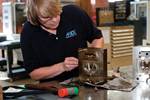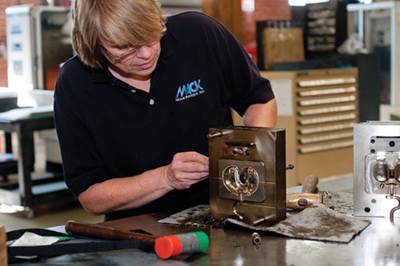A Tooling Vendor Selection Guide
With mold design and quality an essential component of any successful mold program, searching for the right tooling vendor is a methodical process.
Currier Plastics (Auburn, NY)—a custom plastics molder that provides design, blow molding, injection molding and injection stretch blow molding to the packaging industry—has cultivated a strong group of both domestic and international partners it works with to offer its customers the best in leadtimes and costs.
According to Currier’s VP of New Product Development Gary Kieffer, while the quality and cost of both blow-molded and injection-molded products depend on a variety of factors, the design and quality of the tooling or molds is a prime factor in the scope of any successful program.
“Currier’s designers and engineers work hand-in-hand with each of these selected partners when building our custom molds,” Kieffer notes. “The communication between the Currier Plastics team and our mold builders uses the most modern advances in CAD/CAM systems to produce our innovative blow-molded packaging and high-tech injection mold designs.”
First, Currier Plastics tests the part design with Mold Flow part advisor, and has the tool shops it works with send preliminary drawings for review and edit. Then, the company invites the tool shops in for onsite design review meetings or "Go-To" meetings online. “Currier Plastics has cross-functional representation during design review meetings that includes QA, Supply Chain, Production, Process Engineering and Tool Room Manager,” Kieffer explains. “There is a seamless correlation from part design to computer-assisted machining centers cutting tool steel and aluminum. We use SolidWorks as our 3-D design platform and our output data is universally received and converted easily.”
According to Kieffer, Currier seeks out its own injection mold and blow mold tooling vendors who helped to build Currier’s reputation for excellence in manufacturing—based on criteria like facility size, number of shifts supported, number of employees, equipment list, quality system, project management, design platform, yearly sales, number of molds produced per year, and mold size/capacity.
Additionally, Currier seeks mold manufacturers who offer close tolerances and highly finished surfaces that are spelled out via SPI/SPE Standards for both injection and blow molding disciplines, Kieffer adds. “This confidence and diverse supply base from areas like New York, Illinois and Pennsylvania frees our own in-house toolroom to focus on scheduled preventive maintenance that assures our customers on-time production requirements,” he states.
To begin the tooling vendor selection process, Currier first takes a look at trade publications, organizations like the AMBA, attends trade shows and MAPP events to develop a list of potential vendors. Then, it sends each vendor a non-disclosure agreement (NDA). After that is returned, the company sends a supplier survey that asks for information regarding ISO certification and supplier expectations like delivery and quality requirements, then confirms the potential tooling vendor’s capabilities with a site visit.
The company looks for potential tooling vendors that offer creative designs and innovative techniques for: IMC (in mold closing), unscrewing cores, mold cooling, in-mold decorating, mold finishing and component plating, monitoring cycles/production
expedited deliveries with competitive pricing and out-of-the-box terms—special deposits and different gates for payments, Kieffer maintains. “Special terms are based on quality and the capability of the mold to meet or exceed expected mold efficiencies.
“Some key attributes that allow a vendor to make the cut are: ISO certification (ISO 9001:2008), current sales figures indicating a fiscal capability to manage a specific program size; manpower demonstrating throughput capability; type of equipment and technology, and facility; as well as their particular shop specialty,” Kieffer adds.
Kieffer works closely with Currier’s Supply Chain Department—the vendor qualification purchasing/scheduling leg of Currier Plastics that helps keep and maintain ISO procedures and aligns machine time with mold deliveries—to qualify new tool shops as vendors. According to Kieffer, it is his responsibility to qualify tooling vendors, and the Supply Chain Department ensures Currier complies with the company’s requirements (surveys, NDA, etc.) to add to the approved vendor list. “There is always high pressure to get molds sooner than quoted typically because the customer has consumed time during the negotiation process with the end user,” he states. “So, the bottom line is that you are always holding the toolmakers’ feet to the fire for faster delivery.”
To combat this challenge, Currier has established bi-weekly progress reports with requirements to fill out its Critical Gate timelines, which is a form that tracks a job from start to finish and includes target date spaces to write comments. “Photographs are required to accompany the progress reports if it is not practical to visit the shop personally,” he notes.
Kieffer offers the following advice for tooling vendors who wish to work with Currier. “Be patient. It takes a long time to get the right job with enough time to break in a new vendor.”
For More Information:
Currier Plastics / (315) 255-1779
eroberts@currierplastics.com / currierplastics.com
Related Content
Editorial Guidelines: Editorial Advisory Board
The Editorial Advisory Board of MoldMaking Technology is made up of authorities with expertise within their respective business, industry, technology and profession. Their role is to advise on timely issues, trends, advances in the field, offer editorial thought and direction, review and comment on specific articles and generally act as a sounding board and a conscience for the publication.
Read MoreTop 10 Topics to Cover During an ISO 9001 Manufacturing Audit
Take a look at this practical hands-on approach to conducting a quality audit.
Read MoreThe Role of Social Media in Manufacturing
Charles Daniels CFO of Wepco Plastics shares insights on the role of social media in manufacturing, how to improve the “business” side of a small mold shop and continually developing culture.
Read MoreWhat is Driving Mold Lifecycle Management Digitalization?
OEMs are looking to partner with suppliers to share and track data across the supply chain for advanced intervention and process management.
Read MoreRead Next
Achieving High Value Customer Relationships
Mack Molding details how it cultivates relationships with its mold manufacturers and how these collaborations better serve its OEM customers.
Read MoreAre You a Moldmaker Considering 3D Printing? Consider the 3D Printing Workshop at NPE2024
Presentations will cover 3D printing for mold tooling, material innovation, product development, bridge production and full-scale, high-volume additive manufacturing.
Read MoreHow to Use Continuing Education to Remain Competitive in Moldmaking
Continued training helps moldmakers make tooling decisions and properly use the latest cutting tool to efficiently machine high-quality molds.
Read More

















